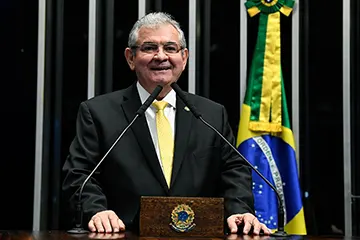 Earlier this week, the president of the Brazilian Senate Committee of Economic Affairs, Vanderlan Cardoso, communicated the appointment of Senator Angelo Coronel as the new rapporteur of Sports Betting Bill 3626/2023 in the Latin American country.
Earlier this week, the president of the Brazilian Senate Committee of Economic Affairs, Vanderlan Cardoso, communicated the appointment of Senator Angelo Coronel as the new rapporteur of Sports Betting Bill 3626/2023 in the Latin American country.
As SuperCasinoSites already reported, September marked the passing of the bill by the Brazilian Lower House of Parliament.
Bill 3626/2023 aims to regulate the sports betting industry in Brazil and provide a clear framework for local and offshore operators, players, and regulatory authorities. Ultimately, it targets a safe and transparent environment for all participants in the sports betting sector. Aside from generating fresh tax revenue, the proposal will bring about a reduction of the share of the black market, providing sports betting enthusiasts with safe and legitimate betting alternatives.
The bill will be subjected to further discussions, with expectations for the Economic Affairs Committee and the Sports Committee (Cesp) to analyze it within a period of 45 days. Following consideration by the said committees, it will advance to the Brazilian Senate Plenary for approval.
Senator Coronel Will Play an Instrumental Role in Molding the Future of the Sports Betting Industry in Brazil
Coronel’s appointment served as a proactive move toward the legalization of the sector, as he is known as an avid supporter of regulating various other gambling products in Brazil. He was also the rapporteur of Bill 186/2014, which suggested the legalization of casinos. Senator Coronel will play an instrumental role in the designing of the legislative draft. His appointment demonstrated the Senate’s major role in regulating the sector. It was embraced wholeheartedly by many participants in the sports betting industry, who perceived it as an advance to a transparent and clearer regulation.
If signed into law, the bill proposes taxation of 18% of sports betting operators’ net revenue. Determining the volume of the expected tax revenue for the state budget would be challenging at such an early stage. However, it is already clear that the proposal calls for a licensing fee of R$30 million ($6 million) for applicants. The license will be valid for a period of three years. Consequently, unlicensed operators will be prohibited from offering their products to Brazil-based punters.
Although the legalization of the sports betting industry in Brazil has sparked a lot of enthusiasm from those involved in the sector, there is still plenty of work to be done before it is finalized. Meanwhile, the world’s leading sports betting operators are considering the financial benefits of entering such an advantageous market. Many of them would be interested in providing their services to sports aficionados in the largest Latin American country.
The Brazilian sports betting market has demonstrated steady growth over the years, being currently influenced by offshore operators, owning to the absence of federal regulations.